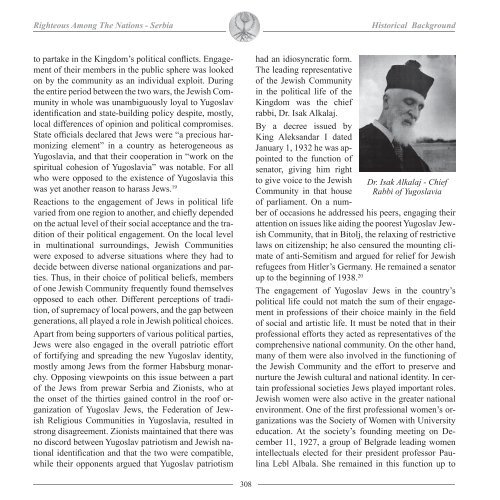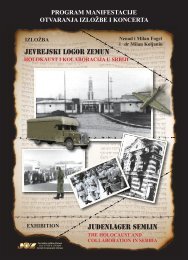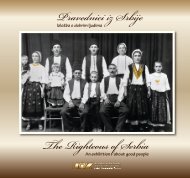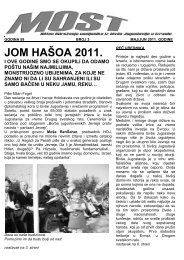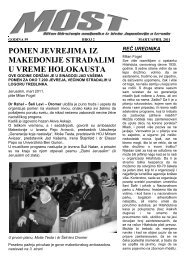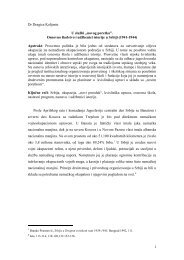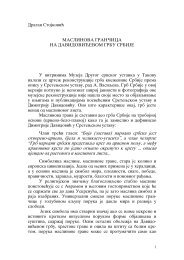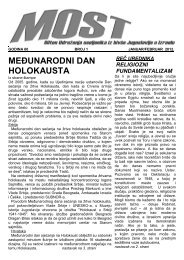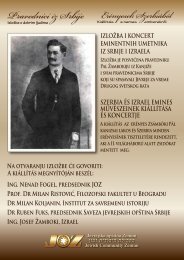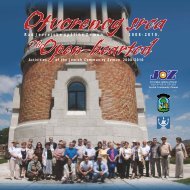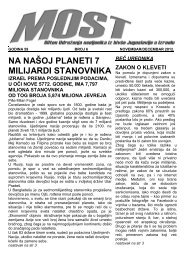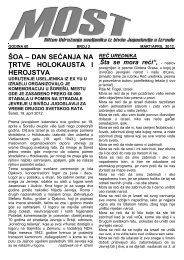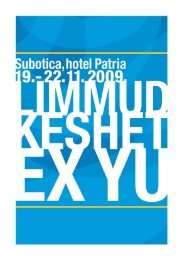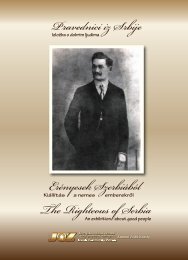Book on the Righteous - Jevrejska opština Zemun
Book on the Righteous - Jevrejska opština Zemun
Book on the Righteous - Jevrejska opština Zemun
You also want an ePaper? Increase the reach of your titles
YUMPU automatically turns print PDFs into web optimized ePapers that Google loves.
<strong>Righteous</strong> Am<strong>on</strong>g The Nati<strong>on</strong>s - Serbia<br />
Historical Background<br />
to partake in <strong>the</strong> Kingdom’s political c<strong>on</strong>flicts. Engagement<br />
of <strong>the</strong>ir members in <strong>the</strong> public sphere was looked<br />
<strong>on</strong> by <strong>the</strong> community as an individual exploit. During<br />
<strong>the</strong> entire period between <strong>the</strong> two wars, <strong>the</strong> Jewish Community<br />
in whole was unambiguously loyal to Yugoslav<br />
identificati<strong>on</strong> and state-building policy despite, mostly,<br />
local differences of opini<strong>on</strong> and political compromises.<br />
State officials declared that Jews were “a precious harm<strong>on</strong>izing<br />
element” in a country as heterogeneous as<br />
Yugoslavia, and that <strong>the</strong>ir cooperati<strong>on</strong> in “work <strong>on</strong> <strong>the</strong><br />
spiritual cohesi<strong>on</strong> of Yugoslavia” was notable. For all<br />
who were opposed to <strong>the</strong> existence of Yugoslavia this<br />
was yet ano<strong>the</strong>r reas<strong>on</strong> to harass Jews. 19<br />
Reacti<strong>on</strong>s to <strong>the</strong> engagement of Jews in political life<br />
varied from <strong>on</strong>e regi<strong>on</strong> to ano<strong>the</strong>r, and chiefly depended<br />
<strong>on</strong> <strong>the</strong> actual level of <strong>the</strong>ir social acceptance and <strong>the</strong> traditi<strong>on</strong><br />
of <strong>the</strong>ir political engagement. On <strong>the</strong> local level<br />
in multinati<strong>on</strong>al surroundings, Jewish Communities<br />
were exposed to adverse situati<strong>on</strong>s where <strong>the</strong>y had to<br />
decide between diverse nati<strong>on</strong>al organizati<strong>on</strong>s and parties.<br />
Thus, in <strong>the</strong>ir choice of political beliefs, members<br />
of <strong>on</strong>e Jewish Community frequently found <strong>the</strong>mselves<br />
opposed to each o<strong>the</strong>r. Different percepti<strong>on</strong>s of traditi<strong>on</strong>,<br />
of supremacy of local powers, and <strong>the</strong> gap between<br />
generati<strong>on</strong>s, all played a role in Jewish political choices.<br />
Apart from being supporters of various political parties,<br />
Jews were also engaged in <strong>the</strong> overall patriotic effort<br />
of fortifying and spreading <strong>the</strong> new Yugoslav identity,<br />
mostly am<strong>on</strong>g Jews from <strong>the</strong> former Habsburg m<strong>on</strong>archy.<br />
Opposing viewpoints <strong>on</strong> this issue between a part<br />
of <strong>the</strong> Jews from prewar Serbia and Zi<strong>on</strong>ists, who at<br />
<strong>the</strong> <strong>on</strong>set of <strong>the</strong> thirties gained c<strong>on</strong>trol in <strong>the</strong> roof organizati<strong>on</strong><br />
of Yugoslav Jews, <strong>the</strong> Federati<strong>on</strong> of Jewish<br />
Religious Communities in Yugoslavia, resulted in<br />
str<strong>on</strong>g disagreement. Zi<strong>on</strong>ists maintained that <strong>the</strong>re was<br />
no discord between Yugoslav patriotism and Jewish nati<strong>on</strong>al<br />
identificati<strong>on</strong> and that <strong>the</strong> two were compatible,<br />
while <strong>the</strong>ir opp<strong>on</strong>ents argued that Yugoslav patriotism<br />
had an idiosyncratic form.<br />
The leading representative<br />
of <strong>the</strong> Jewish Community<br />
in <strong>the</strong> political life of <strong>the</strong><br />
Kingdom was <strong>the</strong> chief<br />
rabbi, Dr. Isak Alkalaj.<br />
Dr. Isak Alkalaj - Chief<br />
Rabbi of Yugoslavia<br />
By a decree issued by<br />
King Aleksandar I dated<br />
January 1, 1932 he was appointed<br />
to <strong>the</strong> functi<strong>on</strong> of<br />
senator, giving him right<br />
to give voice to <strong>the</strong> Jewish<br />
Community in that house<br />
of parliament. On a number<br />
of occasi<strong>on</strong>s he addressed his peers, engaging <strong>the</strong>ir<br />
attenti<strong>on</strong> <strong>on</strong> issues like aiding <strong>the</strong> poorest Yugoslav Jewish<br />
Community, that in Bitolj, <strong>the</strong> relaxing of restrictive<br />
laws <strong>on</strong> citizenship; he also censured <strong>the</strong> mounting climate<br />
of anti-Semitism and argued for relief for Jewish<br />
refugees from Hitler’s Germany. He remained a senator<br />
up to <strong>the</strong> beginning of 1938. 20<br />
The engagement of Yugoslav Jews in <strong>the</strong> country’s<br />
political life could not match <strong>the</strong> sum of <strong>the</strong>ir engagement<br />
in professi<strong>on</strong>s of <strong>the</strong>ir choice mainly in <strong>the</strong> field<br />
of social and artistic life. It must be noted that in <strong>the</strong>ir<br />
professi<strong>on</strong>al efforts <strong>the</strong>y acted as representatives of <strong>the</strong><br />
comprehensive nati<strong>on</strong>al community. On <strong>the</strong> o<strong>the</strong>r hand,<br />
many of <strong>the</strong>m were also involved in <strong>the</strong> functi<strong>on</strong>ing of<br />
<strong>the</strong> Jewish Community and <strong>the</strong> effort to preserve and<br />
nurture <strong>the</strong> Jewish cultural and nati<strong>on</strong>al identity. In certain<br />
professi<strong>on</strong>al societies Jews played important roles.<br />
Jewish women were also active in <strong>the</strong> greater nati<strong>on</strong>al<br />
envir<strong>on</strong>ment. One of <strong>the</strong> first professi<strong>on</strong>al women’s organizati<strong>on</strong>s<br />
was <strong>the</strong> Society of Women with University<br />
educati<strong>on</strong>. At <strong>the</strong> society’s founding meeting <strong>on</strong> December<br />
11, 1927, a group of Belgrade leading women<br />
intellectuals elected for <strong>the</strong>ir president professor Paulina<br />
Lebl Albala. She remained in this functi<strong>on</strong> up to<br />
308


